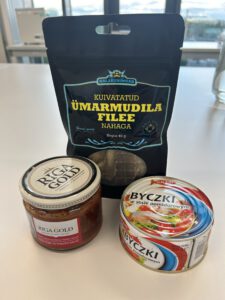
Exploring consumer preferences for round goby products
15 October 2024
Sensory Assessment: Expert Insights
The initial sensory analysis aimed to map the profiles of round goby products currently available on the market in BSR countries. The study found only four commercial products across seven countries, all belonging to two product categories: dried fish products and canned fish in tomato sauce. Given the limited variety, the TFTAK project team also prepared smoked and fried Round Goby samples to assess the panelists’ perception of these products.
A panel of seven experts evaluated six round goby products, using Quantitative Descriptive Analysis (QDA) with a 10-point scale. The panel assessed each product on appearance, odor, taste, and texture, eventually selecting four samples for a subsequent consumer study.

Commercial round goby products
Consumer Study: Pleasantness and Purchase Intentions
In the consumer study, 31 adult participants, most of whom regularly consume fish, evaluated the four selected round goby samples – fried (FRY-LAB), smoked (SMK-LAB), canned in tomato sauce (TOM-EST) and dried (DRY-EST). They rated each product across different sensory modalities, including appearance, odor, taste, and texture to evaluate the overall pleasantness.
The results revealed that the fried round goby consistently scored the highest across all categories, indicating broad consumer appeal. On the other hand, the dried round goby received the lowest scores, particularly in texture, which impacted overall pleasantness. Nonetheless, all products received scores above the midpoint of “5,” suggesting general acceptability among consumers.
When it came to purchase intentions, the fried round goby was again the top choice, receiving the most “yes, definitely” responses. Consumers were more hesitant about purchasing the smoked and dried products, often citing sharp bones in the smoked sample and an unappealing texture in the dried product.
Consumer Preferences: Ranking and opportunties for improvement
Participants ranked the fried round goby as their top choice, with 50% selecting it as their preferred product. The smoked round goby came in second, slightly ahead of the canned product in tomato sauce. The dried round goby chips, however, were least preferred, with nearly half of the participants placing it last.
The study also highlighted areas for improvement. For instance, modifying the smoked product to reduce sharp bones could increase its appeal. Likewise, the canned product in tomato sauce could benefit from enhancements in appearance, odor, and taste, which might make it a more attractive option for consumers.
Fried round goby: consumers’ top choice

Fried round goby
The study underscores the popularity of fried fish products among consumers, which is also mirrored in the consumer ratings of the Round Goby products where the results align with familiar and preferred textures and flavors.
These findings provide valuable insights for stakeholders in the Baltic Sea Region looking to promote round goby as a sustainable and palatable food product. By focusing on consumer preferences and refining product attributes, there is potential to develop a market for round goby that not only addresses the invasive species issue but also offers new, appealing fish products for the region.





